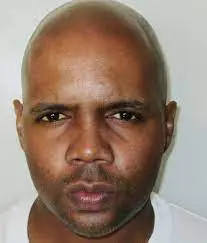Torrey McNabb was executed by the State of Alabama for the murder of Officer Anderson Gordon
According to court documents Torrey McNabb was running from his probation officer when he caused a traffic accident
When Officer Anderson Gordon showed up at the scene Torrey McNabb would shoot him multiple times causing his death
Torrey McNabb would be arrested, convicted and sentenced to death
Torrey McNabb was executed on October 19 2017 by lethal injection
Torrey McNabb Photos

Torrey McNabb FAQ
When Was Torrey McNabb Executed
Torrey McNabb was executed on October 19 2017
Torrey McNabb Case
Following last-minute court challenges, Alabama Thursday evening executed Torrey Twane McNabb, convicted of killing Montgomery police officer Anderson Gordon in 1997.
McNabb’s attorneys filed appeals in the case throughout Thursday to halt the execution that was set for 6 p.m. at the Holman Correctional Facility in Atmore. the last stay was lifted between 8 p.m. and 8:30 p.m. McNabb’s official time of death was 9:38 p.m
Gordon’s family issued a statement after the execution.
“Over 20 years ago we lost a companion, a father a brother and a friend who only wanted to make a difference in his community. Brother, who we affectionately called him, worked to make a difference in his community until his life was taken from him,” the statement read in part. “Though this has been a difficult day for the Gordon family, we also continue to pray for the family of Torrey McNabb.”
McNabb’s final words were as follows:
“Mom, sis, look at my eyes. I’m unafraid … To the state of Alabama, I hate you motherf***ers. I hate you. I hate you.
A brief portion of his final words was unintelligible.
McNabb raised both of his middle fingers twice during the lead-up to his death.
He raised his right arm and grimaced about 20 minutes before he was declared dead, just after a corrections officer performed the second round of consciousness checks. McNabb’s family members and attorneys audibly expressed concern that he was not yet unconscious at that point.
Alabama Department of Corrections Commissioner Jeff Dunn addressed the concerns about the late movements by McNabb during a press conference immediately following his execution.
“Yes, Im confident he was more than unconscious at that point. Ive witnessed several of these executions and involuntary movements are not uncommon,” Dunn said. “We did perform two consciousness checks … We don’t talk specifically about the protocol. But as I said we err on the side of safety and we want to be sure we follow the protocol as it is written.”
Gordon’s wife, three siblings and two children attended the execution, as did two sisters of McNabb’s and two of his attorneys.
Attorney General Steve Marshall also issued the following statement after the execution:
“The 20-year wait for justice is finally over for the family of Montgomery Police Corporal Anderson Gordon III. In 1997, Torrey McNabb took the life of Officer Gordon, shooting him five times as he sat in his patrol car. Tonight, the family of Officer Gordon can finally seek peace.”
Updated at 8:25 p.m.: The Department of Corrections has received word that the stay issued shortly before 6 p.m. has now been lifted. They’ve told reporters witnessing the execution that they will be ferried back to Holman in a few minutes.
The brief order from the court reads, “The application for stay of execution of sentence of death presented to Justice Thomas and by him referred to the Court is denied. The order heretofore entered by Justice Thomas is vacated.
McNabb has spent the last 18 years on death row, after being convicted of fatally shooting Montgomery police officer Anderson Gordon in September 1997. McNabb was convicted on two capital murder counts– one for killing Gordon while he was on duty, and one for killing him as Gordon sat in his patrol car. McNabb also was found guilty of two additional counts of attempted murder.
McNabb, 40, who was convicted in the shooting death of Gordon, had tonight’s execution stayed by U.S. District Court Judge Keith Watkins on Monday. A three-member panel of the U.S. 11th Circuit Court of Appeals on Wednesday kept that stay in place.
The Alabama Attorney General’s Office then appealed to the U.S. Supreme Court late Wednesday in an effort to have the execution go on at 6 p.m. tonight.
In a brief order issued just after 4 p.m. today, the U.S. Supreme Court ordered the stay be lifted, clearing the way for tonight’s execution.
“Alabama has already carried out four executions using this protocol,” the AG stated in its appeal to the Supreme Court. “Three of those executed inmates were co-plaintiffs in this case, and their stay requests were denied by both this Court and the Eleventh Circuit.”
McNabb had been granted a stay under a law called the All Writs Act.
In its order this afternoon granting the Attorney General’s request, the U.S. Supreme Court stated that inmates “seeking time to challenge the manner in which the State plans to execute them must satisfy all of the requirements for a stay, including a showing of a significant possibility of success on the merits.”
“The All Writs Act does not excuse a court from making these findings. Because the District Court enjoined Respondent’s execution without finding that he has a significant possibility of success on the merits, it abused its discretion. We accordingly vacate the injunction.”
Associate U.S. Supreme Court Justices Stepehn Breyer and Sonia Sotomayor stated they would have denied the request by the AG to vacate the injunction.
McNabb’s attorneys then filed a request this afternoon with Judge Watkins to grant a stay with a finding of a “substantial possibility of success.” Watkins had not ruled prior to 5:30 p.m. Thursday.
https://www.al.com/news/2017/10/us_supreme_court_okays_executi.html









